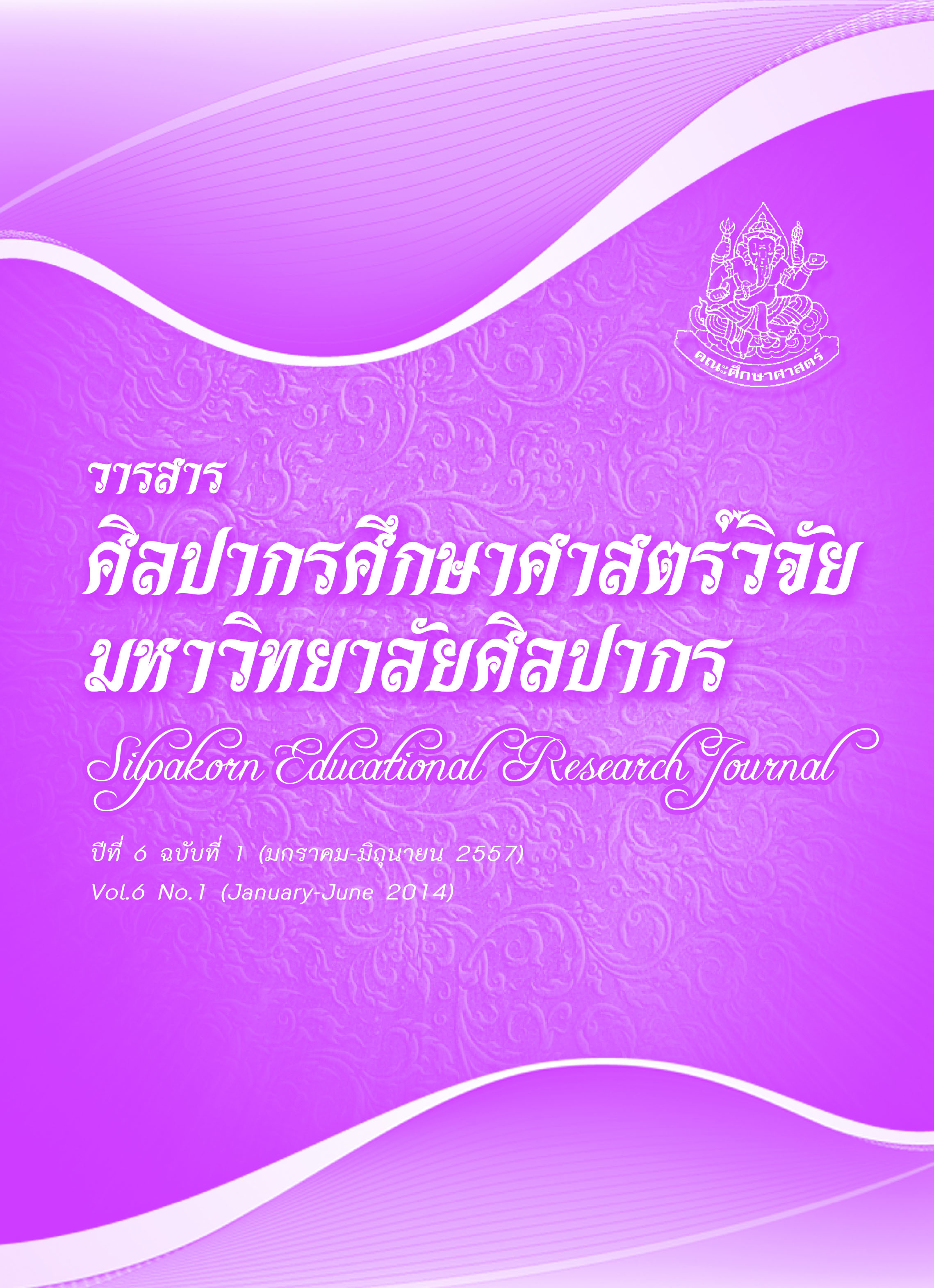การพัฒนากิจกรรมการเรียนรู้เพื่อสร้างเสริมคุณภาพชีวิตแรงงานต่างด้าว
คำสำคัญ:
กิจกรรมการเรียนรู้ / คุณภาพชีวิต / แรงงานต่างด้าวบทคัดย่อ
การวิจัยเรื่องการพัฒนากิจกรรมการเรียนรู้เพื่อสร้างเสริมคุณภาพชีวิตแรงงานต่างด้าว มีวัตถุประสงค์เพื่อ 1. ศึกษาสภาพและความต้องการพัฒนาคุณภาพชีวิตแรงงานต่างด้าว 2. พัฒนากิจกรรมการเรียนรู้เพื่อสร้างเสริมคุณภาพชีวิตแรงงานต่างด้าว ประกอบด้วย 4 ขั้นตอน ได้แก่ 1) การศึกษาสภาพและความต้องการในการสร้างเสริมคุณภาพชีวิตแรงงานต่างด้าว โดยการศึกษาเอกสารและการสัมภาษณ์ ผลการวิจัย พบว่า แรงงานต่างด้าวมีความต้องการในการสร้างเสริมคุณภาพชีวิต ด้านสุขภาพ ด้านการศึกษา ด้านรายได้และเศรษฐกิจ 2) การออกแบบและพัฒนาแผนการจัดกิจกรรมการเรียนรู้ โดยใช้ทฤษฏี Andragogy ของ Knowles ปรัชญาคิดเป็นของโกวิท วรพิพัฒน์ และขั้นตอนการพัฒนาโปรแกรมการศึกษานอกระบบของ Boyle 3) การทดลองจัดกิจกรรมการเรียนรู้เพื่อสร้างเสริมคุณภาพชีวิตแรงงานต่างด้าว โดยใช้วิจัยเชิงทดลองแบบกลุ่มเดียว จากการทดลอง พบว่า ประสิทธิภาพของแผนการจัดกิจกรรมการเรียนรู้มีประสิทธิภาพเท่ากับ 81.27/81.40 และ4) การประเมินคุณภาพชีวิตแรงงานต่างด้าวที่ผ่านการเข้าร่วมกิจกรรมการเรียนรู้ โดยการสัมภาษณ์แรงงานต่างด้าวที่ผ่านการเข้าร่วมกิจกรรม และนายจ้าง ผลการวิจัย พบว่า ด้านสุขภาพ มีการพัฒนา คือ มีบัตรประกันสุขภาพแรงงานต่างด้าว ได้เข้ารับการตรวจสุขภาพประจำปี มีการเลือกใช้ยาตรงกับโรค มีการรับประทานอาหารที่เป็นประโยชน์ รู้จักการใช้เวลาว่างให้เป็นประโยชน์ และเข้าถึงบริการสาธารณสุข ด้านการศึกษา มีการพัฒนา คือ การฟังภาษาไทย การพูดภาษาไทย การอ่านภาษาไทย การเขียนภาษาไทย ทราบถึงสิทธิในการเรียน มีช่องทางในการรับรู้ข่าวสาร ทราบถึงช่องทางในการศึกษาอบรมตามความสนใจ และหารายได้เสริมจากการทำงานล่วงเวลา ด้านรายได้และเศรษฐกิจ มีการพัฒนา คือ มีการออม มีการจดบันทึกรายรับรายจ่าย และประหยัด
The research on Development of Learning Activities to Enhance Life Quality of Foreign Labours aims (1) to study the conditions and needs for quality of life improvement of foreign labours, (2) to develop a learning activity plan for improving their quality of life. The research process follows into 4 steps: 1) to study the conditions and needs of foreign labours for quality of life enhancement through documentary research and interviews, and it was found out that the foreign labours needed to improve their quality of life in 4 aspects namely: health, education, income and economic aspects, 2) to design and develop a learning activity plan based on Knowles’andragogy theory, Kowit Vorapiphat’s Khit-pen theory and Boyle’s educational program development process, 3) to conduct the learning activities through a single experimental group . It revealed that the efficiency of the learning activity plan was 81.27 / 81.40, and 4) to assess the quality of life enhancement of the experiment group and the employers by interviewing. The findings were as follows: (a) Health aspect: the foreign labours got health insurance cards and annual health check up, enabled to access the appreciate medicine to their symptom, take the nutritious meals, and spend their free time usefully, as well as access the public health care services. (b) Education aspect: the foreign labours enabled to listen, speak, read and write Thai. They learned about the rights of studying, the accessibility to information, the training courses for self-development in accordance with their interests, and earned the additional income by working more overtime hours. (c) Income and (d) Economic aspects: the foreign labours had saving, kept records of income and expenditures, and learned to be economical.





